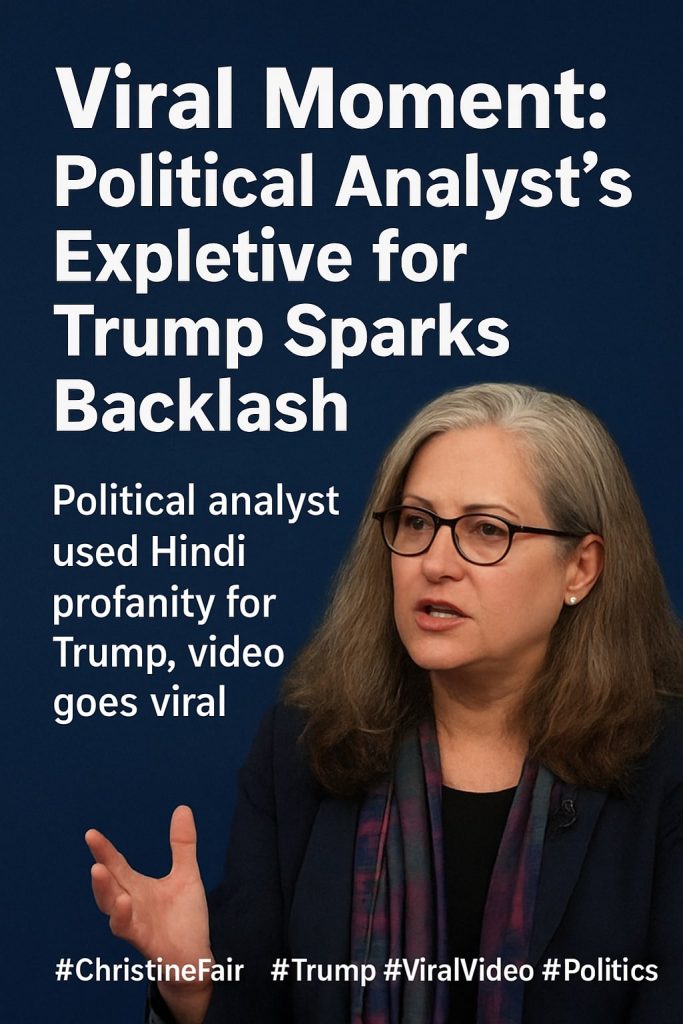
August 26, 2025 — Washington, D.C. — A viral political controversy erupted this week when U.S. political scientist Carol Christine Fair used a Hindi profanity to describe former President Donald Trump during an interview. The clip quickly spread across social media platforms, sparking heated reactions in both the United States and abroad.
What Happened in the Viral Clip
Fair, a professor of international affairs and frequent media commentator, appeared on a talk show hosted by Pakistani-American journalist Moeed Pirzada. During a heated exchange about U.S. foreign policy and Trump’s leadership style, she bluntly referred to the former president using a Hindi cuss word—translated loosely as “scoundrel” or a crude insult.
The interview clip was posted on YouTube and rapidly circulated on X (formerly Twitter), Facebook, and Instagram, racking up millions of views within hours. The hashtag #ChristineFair began trending worldwide, while politically divided Americans clashed in the comments section.
Supporters vs. Critics
Fair’s supporters argue her comments reflect deep frustration with Trump’s rhetoric and policies, particularly his aggressive stance on immigration and law enforcement. Many online users praised her for speaking “truth to power” in a raw and unfiltered way.
Critics, however, slammed the remark as unprofessional and offensive, noting that using profanity in another language does not excuse derogatory political commentary. Trump supporters called for her resignation from Georgetown University, where she has taught since 2009, and accused her of fueling “toxic political discourse.”
One Trump voter commented on X:
“Imagine the outrage if a conservative professor used a racial slur on live TV. This is the left’s double standard on full display.”
Meanwhile, Fair herself doubled down, telling followers that she refuses to apologize:
“I said what millions of Americans think. If you don’t like it, that’s on you.”
Why It Went Viral
Several factors fueled the viral spread of the video:
- Shock Value — A U.S. professor using profanity in Hindi caught both Indian and American audiences by surprise.
- Cultural Curiosity — Many viewers unfamiliar with Hindi slang searched its meaning, driving the story further.
- Polarized Politics — With Trump once again dominating headlines, any insult—especially one cross-cultural—instantly becomes political fodder.
- Social Media Algorithms — Platforms like TikTok and X quickly amplified the clip because of its high engagement and controversy.
Global Reactions
The controversy did not remain confined to the U.S. Indian and South Asian media outlets seized on the story, with headlines highlighting the “Hindi insult heard around the world.” Many commentators in India debated whether it was appropriate for foreign academics to casually use local slang in political contexts.
Pakistani outlets, meanwhile, showcased the viral moment as evidence of the global polarizing effect of Trump. Some praised Fair for “calling out American hypocrisy,” while others said the remark “lowered the standard of international political discourse.”
The Larger Conversation About Political Speech
This viral episode highlights a broader trend in global politics: the blurring line between serious commentary and performative outrage. In the age of short clips and viral soundbites, bold statements often overshadow nuanced debate.
Political analysts note that this incident also raises important questions:
- Should academics and experts maintain professional decorum even when frustrated with politicians?
- Does profanity weaken legitimate criticism by shifting attention to tone rather than substance?
- Or does raw, emotional language better capture public anger and connect with ordinary people?
Impact on U.S. Politics
While unlikely to significantly alter Trump’s political standing, the controversy adds to the already toxic climate of 2025. Trump himself has not yet commented on Fair’s remark, but several Republican lawmakers denounced it as “academic elitism at its worst.”
Democrats, on the other hand, have largely stayed quiet, perhaps wary of being seen as endorsing or condemning an academic’s personal opinion.
Conclusion
The viral clash between Christine Fair and Donald Trump supporters underscores how political commentary is no longer limited to academic journals or op-eds. Instead, it lives and breathes on social media—where one remark, even in another language, can set off a global storm.Whether Fair’s choice of words is seen as brave honesty or unprofessional insult depends on political perspective. What is certain is that in today’s digital media landscape, every word carries viral potential—and the boundaries of political discourse continue to be tested.



